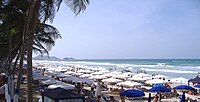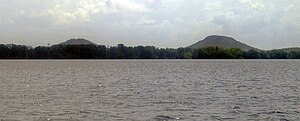Margarita Island (Isla de Margarita, Spanish pronunciation: [marɣaˈɾita]) is the largest island in the Venezuelan state of Nueva Esparta, situated off the northeastern coast of the country, in the Caribbean Sea. The capital city of Nueva Esparta, La Asunción, is located on the island. Primary industries are tourism, fishing and construction.
Cities
La Asunción
La Asunción from Santa Rosa Castle
La Asunción is the capital of the Federal State of Nueva Esparta with a population of around 28,500. It is the seat of the regional government. The city is overlooked by the Santa Rosa Castle of La Asunción
Pampatar
Beach near Pampatar
The urban area of Pampatar
has a population of around 50,000. A number of the island's larger
shopping malls are located in the city, namely Sambil Margarita, Rattan
Depot, Centro Comercial La Vela, Centro Comercial Costa Azul, Centro
Comercial AB (Avenida Bolivar) and La Redoma. The Royal Fortress of San Carlos Borromeo, constructed in the late 17th century, is located in Pampatar. The city also has several beaches.
Porlamar
The largest city on Margarita Island is Porlamar.
The population can reach 125,000 in the high season, while in the low
season, the population is about 85,000. Two beaches are located within
the city.
Juan Griego
La Galera, a Spanish colonial fort of Juan Griego
Juan Griego
is a city on the northern side of Isla Margarita, and is the most
northern port in Venezuela. It has a population of 28,256 inhabitants
(as per census of 2001) and is capital of the Marcano municipality of
the Nueva Esparta state. Its church of gothic styling was constructed in
1850 by Fray Nicholas de Igualdad is still, along with the lovely bay,
the symbol of the city. The La Galera fortress, where in the early 1820s
a fierce battle for independence was fought, is located near the city
centre. In 1973, the island become a free port and the city once again
become the second city in sequence of importance in the commercial
activities after Porlamar.
Tourism
Margarita Hilton at Puerto Cruz beach
There are at least 50 beaches on the island, which has a 106 miles (171 km) coastline. Playa El Yaque is popular as a windsurfing and kitesurffing location. Playa Parguito, Playa Caribe, Playa Punta Arenas, Playa El Agua and Playa Puerto Cruz are also popular beaches.
Margarita Island was the venue for the 2014 Caribbean Series.
It was the second time it hosted the Series; 2010 was the first. It is
expected that the development of the tourism industry on the island will
be boosted by the influence of predominantly Dominican, Mexican, Puerto Rican, and Venezuelan sports enthusiast who arrived for the competition.
Population
A typical house in San Juan Bautista
View of Margarita island at night.
The demonym for islanders is Margariteños/as and Neoespartanos/as. Ethnic minority populations of some significance include Lebanese, Spanish, Italian,
German, French, Dutch, Swedish, Norwegian, Danish, Argentine, Chilean,
Uruguayan, Colombian, and Chinese. Immigrants from mainland Venezuela
are colloquially called navegaos by islanders.
A little less than 25% of the Neoespartanian population live in
Porlamar. Margarita's population is just under 440,000, although this
tends to fluctuate during holiday periods and the festive season.
Religion
Basílica de la Virgen del Valle (Valley of the Espíritu Santo)
The predominant religion is Roman Catholicism.
Other Christian denominations are also present. Of the churches that
present in the Neospartan entity, among the most important are: Basílica
de la Virgen del Valle (in the Valley of the Espíritu Santo), Cathedral
of La Asunción, Iglesia San Juan Evangelista (Juangriego), Iglesia
parroquial de San Juan (San Juan Bautista), Iglesia de San Nicolás de
Bari (Porlamar), of the San José de Paraguachi and other churches and
chapels minor located in populations of Santa Ana, Punta de Piedras,
Porlamar, Pampatar and virtually all the towns of the island. There are
also small populations of Jews and Muslims.
Evangelical Christian churches have had a significant growth in
recent years demonstrating their presence and impact in the population
of the island. One of the fastest-growing is the Centro Cristiano Casa
de Alabanza (CCCA), present in Porlamar, Juan Griego, La Asunción and
Tubores Municipality.
Main article: Virgen del Valle
The patron saint of eastern Venezuela is the Virgen del Valle and in the population El Valle del Espíritu Santo
is the Basílica Menor de Nuestra Señora del Valle, which approaching
Margarita, Coche and Cubagua Islanders visit to honor her on her feast
day.
Natural Heritage
Las Tetas de María Guevara (Maria Guevara's breasts)
The Las Tetas de Maria Guevara, located in a coastal plain in the south of the 1,670 hectare Laguna de La Restinga National Park, consists of two small twin hills with a height of 135 metres (443 ft). The vegetation around the hills is desert, with cacti, prickly pears, yaks, guamaches. The fauna is diverse, including desert lizards, rabbits, rattlesnakes and coral.
Las Tetas de María Guevara (twin mountains)
The legend
told by the inhabitants of the island goes that the name María Guevara
comes from a white young girl who was heavily involved in the War of Independence
and that upon her death, the hills rose on her grave. One other
Margaritan myth says the source of the name also comes from the same
woman, but that she was from Cumaná
and came to the island to lead a group of men in fishing activities. As
she had small breasts, by way of derision whenever they sighted the
hills said, "there are the lady's tits" and the name was created. The
area was declared a national park on February 27, 1974.








No hay comentarios:
Publicar un comentario